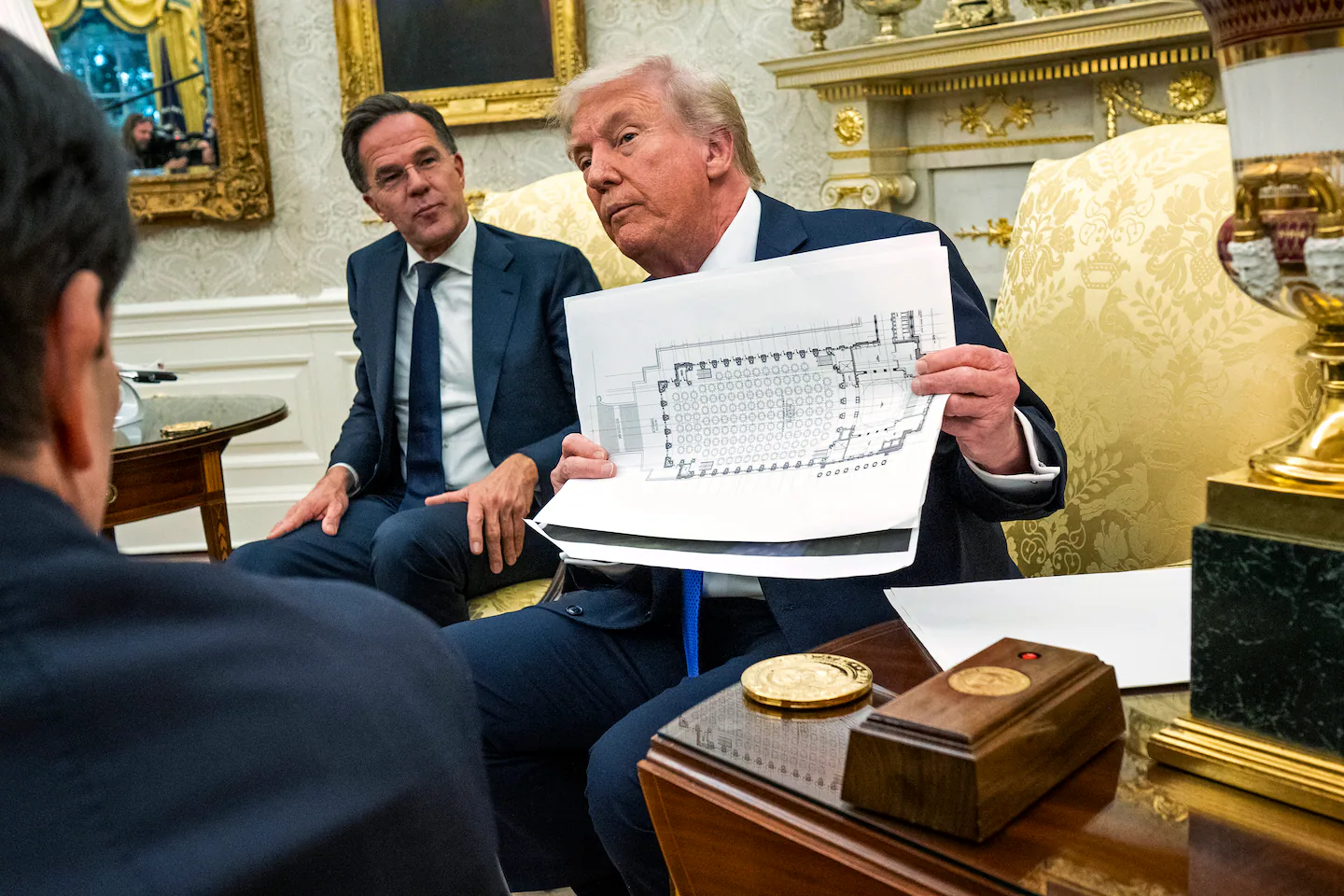Copyright The Boston Globe

Among the donors not disclosed by the White House are a pair of health care companies seeking to protect or expand Medicare reimbursement for their products, as well as the Wall Street powerhouse BlackRock, whose bid to acquire a stake in Panama Canal ports has been supported by Trump amid opposition from China. Another is Jeff Yass, a major investor in TikTok’s parent company who could benefit from a Trump-backed deal to keep the social media app up and running in the United States. The chipmaking giant Nvidia, which could be the beneficiary of a deal with the Trump administration to facilitate trade with China, was also not on the list of donors released by the White House. But recently the company’s CEO revealed that it was among the donors, saying he was “proud to contribute in a small way to what will be a historic and national monument for our country.” Still others attended a dinner at the White House last month for donors who gave $2.5 million or more to build the ballroom, but their presences were not disclosed by the administration, and not all of them have publicly acknowledged whether they donated. They include Greg Brockman, president of OpenAI, which has lobbied Trump’s team to block state artificial intelligence laws. Trump’s fund-raisers have been circulating a pledge form, a copy of which was obtained by the Times, seeking contributions for the ballroom, which gives donors the option of withholding their identities from public disclosure. Such donations could remain anonymous in perpetuity, as the funds are being raised and managed by the Trust for the National Mall, a nonprofit registered under a section of the tax code for charities that provides benefits for donors including the ability to claim tax deductions and to keep their identities anonymous. A White House official said in a statement that the identities of donors “who wish to be named publicly” will be disclosed, but that “donors also have the option to remain anonymous and we will honor that if that’s what they choose.” Ethics experts have raised concerns about the donations, including the possibility that they could lead to special treatment for donors or test the bounds of a prohibition on federal agencies accepting gifts from private sources. Trump has said he would supplement outside donations with his own money, and has cast the effort to build the ballroom as an apolitical, selfless act to address a lack of space inside the White House for some official dinners. While the pledge form refers to the project as “the President Donald J. Trump Ballroom,” Trump said last month, “I don’t have any plan to call it after myself.” During a speech at the White House dinner for assembled donors, which he said numbered nearly 130 people, Trump promised that they would be among the first guests welcomed into the completed ballroom “if I still like you at that time, which I’m sure I will.” The fund-raising is being overseen by Meredith O’Rourke, Trump’s lead campaign finance operative, with assistance from a handful of lobbyists and consultants who have been top bundlers for various Trump groups. Among them are Brian Ballard, Jeff Miller, and Reince Priebus, who was Trump’s White House chief of staff in 2017. The White House official called O’Rourke “a valuable member in the president’s fund-raising operation, regardless of the project.” She attended the White House donor dinner, as did Ballard, Miller, and Priebus. O’Rourke and Ballard declined to comment. Miller and Priebus did not respond to requests for comment. The firms of Ballard, Miller, and Priebus represent a number of the corporations that donated to the ballroom fund, as well as dozens of other clients seeking favor from Trump’s administration. Some of the donors to the ballroom fund who have the most to gain — or lose — from administration actions include: Health care ◼️Vantive: The kidney care company, which has been pushing the Trump administration to allow more Medicare reimbursements for at-home dialysis, made a previously unreported donation to the ballroom fund, according to two people familiar with the fund-raising who were not authorized to discuss it. Katie Villany, a Vantive spokesperson, would not confirm the amount, but said the company’s CEO, Chris Toth, attended the dinner and called the ballroom “a space that will enable public discourse for many years to come.” ◼️ Extremity Care: The company or one of its affiliates made a previously unreported $2.5 million donation to the ballroom fund, according to a person familiar with the fund-raising who was not authorized to discuss it. Extremity Care has been arguing to protect Medicare reimbursement for the bandages it makes using dried bits of placenta. After the company donated $5 million to Trump’s super political action committee and one of its executives attended a fund-raiser with Trump in March, the administration announced it would delay until next year a plan to limit Medicare’s coverage of the bandages. The company did not respond to requests for comment. Finance ◼️ BlackRock: The firm — which had been targeted by the Trump administration and influential conservative groups over its support for environmental, social, and governance causes — donated at least $2.5 million to the ballroom effort and sent executives to the White House dinner, according to two people familiar with the fund-raising. BlackRock declined to comment. ◼️ Jeff Yass: The billionaire financier personally donated at least $2.5 million to the ballroom fund drive, a person familiar with the donation said. Yass attended the White House dinner along with Tony Sayegh, an official in the first Trump administration who now works for Yass’ trading firm, Susquehanna International Group, according to three attendees. Susquehanna is a major shareholder in ByteDance, the China-based company that owns TikTok. Trump has repeatedly delayed enforcement of a federal law that would ban TikTok in the United States as a national security threat, and has been working on a deal that could transfer the app to a US ownership group. Yass and Sayegh did not respond to requests for comment. ◼️ Stephen A. Schwarzman: The CEO of the investment firm Blackstone Group has been a backer of Trump and has supported the administration’s tariffs. Matt Anderson, a spokesperson for Blackstone, said the donation for the ballroom was from Schwarzman, not the firm, and that it was “not related to any other issue” other than his support for the project. Telecommunications ◼️ Comcast: The company donated millions of dollars to the ballroom effort and had two executives in attendance at the thank-you dinner, according to a person familiar with the fund-raising. The donation came after Comcast, which owns NBC and is in the process of spinning off cable channels including MSNBC, drew criticism from Trump in April. Comcast is reportedly exploring a deal to acquire cable assets from Warner Bros. Discovery that could require approval from the federal government. The company declined to comment. ◼️ T-Mobile: The wireless carrier — which won approval from the Federal Communications Commission in July to acquire portions of another wireless business after acceding to pressure from Trump to drop diversity, equity, and inclusion programs — donated to the ballroom effort, and its executives were invited to the dinner. The company said in a statement that it “has no role in the use of those funds or decisions related to the construction of the ballroom.” Tech ◼️ Microsoft: The software behemoth, which has significant contracts with the federal government, was listed by the White House as among donors to the ballroom. While the company has courted Trump, he nonetheless attacked it in September for hiring Lisa Monaco, a high-ranking official in former President Joe Biden’s Justice Department. So it attracted notice at the dinner when Brad Smith, Microsoft’s president, appeared with a delegation from his company, according to people briefed on the event. Microsoft declined to comment. ◼️ Google: The company, which has done business with the Pentagon, has been threatened by Trump. Its video platform YouTube agreed in September to donate $22 million to the ballroom project as part of a settlement with Trump and others whose accounts were suspended after the Jan. 6, 2021, riot at the Capitol. Google officials attended the dinner, according to people briefed on it. Google declined to comment. ◼️ Amazon, Apple, and Meta: The tech giants, which are the subject of antitrust cases being pursued by the federal government (as is Google), donated to the ballroom and sent representatives to the dinner. The companies did not respond to requests for comment. Crypto ◼️ Ripple: The cryptocurrency company donated millions to the ballroom and had at least one executive in attendance at the White House dinner, according to a person familiar with the fund-raising. The executives have aggressively courted Trump, donating to his inauguration and attending multiple small group dinners with him. In August, amid the Trump administration’s rollback of years of aggressive cryptocurrency enforcement, the Securities and Exchange Commission settled a long-running case against Ripple. ◼️ Tether America: The US operation of this overseas crypto company that has faced accusations of lying about its finances and allowing crime to flourish on its platform donated to the ballroom fund, according to the White House. Tether has worked to curry favor in Trump’s Washington, hiring Miller to lobby and Bo Hines, who worked on crypto issues in the White House until August, to expand the company’s US operation. Hines and another company official attended the White House dinner, according to a person familiar with the event. Hines and a Tether spokesperson did not respond to requests for comment. ◼️ Coinbase: This cryptocurrency exchange donated to the ballroom fund, according to the White House. The SEC in February dropped a lawsuit against the company, which declined to specify how much it gave but said in a statement that it was pleased to support the trust. Tobacco ◼️ Altria and Reynolds American: The companies, which have urged Trump to resist tighter regulation of e-cigarettes, donated to the ballroom and sent representatives to the dinner, according to the White House. Company representatives did not respond to requests for comment. Defense ◼️ Palantir: The data analysis company, whose cofounders have been major donors to the president, is playing an increasing role in defense and government contracting under Trump’s administration, which tapped Palantir to facilitate a plan to share data across agencies. It donated at least $2.5 million to the ballroom effort and sent representatives to the dinner, according to people familiar with the drive. The company did not respond to a request for comment. ◼️ Booz Allen Hamilton and Lockheed Martin: The major defense contractors both donated to the ballroom and sent officials to the dinner, according to the White House. Booz Allen did not respond to requests for comment. Lockheed said in a statement that it was “grateful for the opportunity to help bring the president’s vision to reality and make this addition to the People’s House, a powerful symbol of the American ideals we work to defend every day.”



